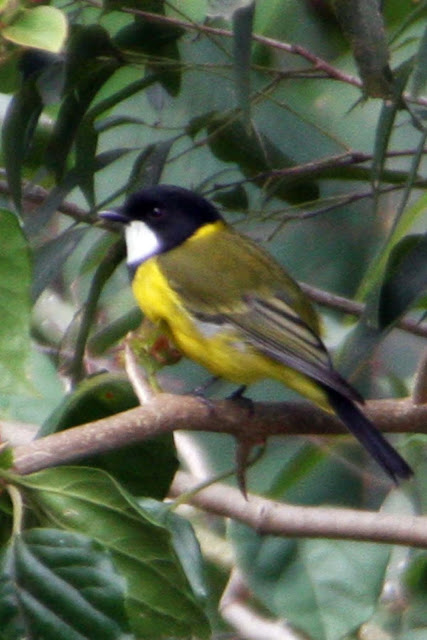 | ||
| Blue Gum towers behind the flowering Honey Gem Grevillea |
 | |
| Tidying up the dam wall |
In the Hen House the latest brood of chicks have developed to pullet stage and past the period were they are more likely to get sick. They are now out of the brooder and mingling with the main flock, although separated at night still.
 | |
| A Salmon Faverolle in the Pullet House. |
On the wild bird front we are beginning to get a sniff of things to come as the Grevilleas begin to move towards peak bloom and the nectar feeders start appearing. These include the Little and Noisy Friarbirds, Brown, Scarlet, Lewins and Yellow-faced Honeyeaters and the Eastern Spinebills. One, very pretty visitor this month was a juvenile Pale Headed Rosella.
 |
| Immature Pale Headed Rosella feeding on the young flower buds of an Ivory Whip Grevillea. |
 |
| Only the juveniles have the red head feathers. These disappear in adulthood. |
 |
| The back plumage is classic for the Pale Headed Rosella. |
 | |
| Yes, you are a very pretty bird. |
As mentioned, the adults lose the red feathers and become all yellow, although some cross breed with Eastern Rosellas and the resulting hybrids often have patches of scarlet on their head and face.
 | |
| Adult Pale Headed Rosella stretching her legs. |
I must take a moment to apologise to the plant, the Velvet Leaf. In previous posts I have said that I hadn't seen it attract any birds despite the yummy looking berries. Well this month I was proved wrong, as the Velvet leaf attracted a flock of Silvereyes on an almost daily basis. So well done Velvet Leaf, you do pull in the birds.
 |
| Silvereye on the Velvet Leaf. |
And so onto the monthly list for July...
Regulars (Seen at least x5 per week)
Australian Magpie
Bar-Shouldered Dove
Bronzewing
Brown Honeyeater
 |
| Brown Honey Eater singing in the Grevilleas. |
Double-barred Finch
 |
| Double-barred Finches |
Eastern Spinebill
 |
| Eastern Spinebill |
Eastern Whipbird
Galah
Laughing Kookaburra
Mallard Duck
Pacific Black Duck
Pale Headed Rosella
Peaceful Dove
Pied Butcherbird
 |
| Pied Butcherbirds after the cat food. |
Pied Currawong
Rainbow Lorikeet
 |
| It was a cold morning. |
Sulphur Crested Cockatoo
Torresian Crow
Welcome Swallow
Wood Duck
Common (Seen at least x2 per week)
Brush Turkey
Grey Fantail
 | |
| Grey Fantail |
King Parrot
Lewin's Honeyeater
Noisy Friarbird
Noisy Miner
Silvereye
Striated Pardalote
Yellow-faced Honeyeater
 |
| Yellow-faced Honeyeater |
Yellow-tailed Black Cockatoo
Uncommon (Seen 2-5x per month)
Australian Ibis
Black-faced Cockoo Shrike
Brown Cockoo Dove
 |
| Brown Cuckoo Dove |
Brown Goshawk
Forest Kingfisher
Grey Shrike Thrush
Little Corella
Masked Plover
Rainbow Bee Eater
Red-backed Fairy Wren
 |
| Red-backed Fairy Wren |
Rufous Whistler
Top Knot Pigeon
Wedge-tailed Eagle
White-eyed Duck
 | |
| White-eyed Duck a.k.a a Hardhead |
Rare (Only seen once in the month)
Blue-cheeked Honeyeater
Golden Whistler
 |
| Male Golden Whistler |
Magpie Lark
Pheasant Coucal
Red Goshawk
Royal Spoonbill
Scaly-breasted Lorikeet
Spangled Drongo
White-bellied Cuckoo Shrike
White-bellied Sea Eagle
White-bellied Tree Creeper
White-faced Heron
Yellow-rumped Thornbill
And of course the off Red-backed Wallaby..
 | |
| Wallaby and joey on the dam wall. |
Which is 57-species, only one up on last month, but the numbers are increasing and as I write this (half way through August) the promise of lots of interesting small birds is coming true.
